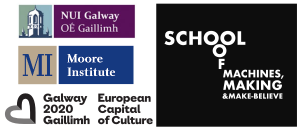
- This event has passed.
Future Landscapes Workshop: Enhancing Seen & Unseen Landscapes with Mixed Reality
May 7, 2019 - May 31, 2019
Event Navigation

UPDATE: Applications for the fee-waiver scholarships available via the Moore Institute and Galway 2020 are now closed
Future Landscapes is an intensive four-week, full-time workshop created in conjunction with the School of Machines, Making and Make-Believe and Galway 2020.
The aim of the workshop is to allow participants to develop the skills to explore the use of immersive technologies, such as Virtual and Augmented Reality, within the context of Landscape, both seen and unseen. This may include, for example, the augmentation of physical landscapes, or creating immersive experiences related to social or political landscapes. Technical experience is not a prerequisite for participating in the course.
Overview
Compelling us all is an interest in creatively exploring vast landscapes in the physical world and of the mind while gaining an understanding of the potentials of augmented-, virtual-, and mixed reality through a myriad of critical, conceptual, and hands-on approaches.
 Using technology to imagine unknown realities can inspire new ways of looking at the world. In designing new forms of interactive and tactile experiences, artistic creation and storytelling, what could we add or augment to our surroundings to develop new narratives about landscapes, be them physical, social, or mental, that permeate our lives? What forms of play and togetherness might we be able to create and sustain? Could thoughtful discourse on landscapes and realities empower us into making impactful change?
Using technology to imagine unknown realities can inspire new ways of looking at the world. In designing new forms of interactive and tactile experiences, artistic creation and storytelling, what could we add or augment to our surroundings to develop new narratives about landscapes, be them physical, social, or mental, that permeate our lives? What forms of play and togetherness might we be able to create and sustain? Could thoughtful discourse on landscapes and realities empower us into making impactful change?
Course Description
Mixed Reality (MR) refers to a suit of technologies that anchors virtual objects in a space, allowing for the possibility of “real” interaction with those objects. With Augmented Reality (AR), in addition to superimposing images and 3D models over the camera feed, these toolkits offer the opportunity to map physical spaces, understand ambient lighting and track the position of a phone in space. Pokemon Go used these techniques to capture the public interest and brought AR into the mainstream, but it begs the question, what else can we do with this technology? In this class, we’ll explore the spectrum of what these tools have to offer.
These techniques are just a starting point for what may be possible. There is much experimentation to be done by utilising the other capabilities of handheld devices to stream live data, communicate with others, and incorporate information from built in sensors.
Although various types of augmented and virtual reality systems have existed for some time, recent advances in mobile technology platforms provide us more powerful ways of creating and sharing these experiences with a wider audience. So as the technology is advancing, what happens when we bring conceptual ideas and criticality to the fore?
The primary tool of this program will be Unity 3D. We will work with the ARKit and Vuforia libraries. As we engage the potential of these new tools, we will also take a critical perspective discussing the shortcomings and challenges of future technologies.
In this course, you will be introduced to:
- Critical and conceptual development of projects *
- Creative development with Unity3D *
- Scripting in Unity3D to create interactivity *
- Introduction to ARKit (iOS) and Vuforia *
- Attaching virtual objects to real image markers *
- Creating both AR and VR experiences *
- Recording and placing sounds inside a virtual AR space *
- Designing an AR space that can be shared and explored with multiple people at the same time *
- Building mixed reality experiences *
- An amazing network and community of like-minded creative beings and potential future collaborators
* No previous experience necessary
Course Outline
Week 1: Introductions, concepts, narratives, play, and critical discourse.
Week 2: Tools and techniques for creating interactive experiences in Unity
Week 3: Advanced tools and techniques for creating interactive experiences in Unity. Adding physicality into our work through props and found artefacts.
Week 4: Preparing talks, presentations, and Mixed Reality experiences for final showcase open to the public
Who is this program for?
This workshop is geared toward anyone involved in creative projects (such as architects, designers, makers, artists, musicians, performers) and members of the arts and humanities research community, that wish to begin incorporating mixed reality experiences into their work or practice.
This course approaches mixed reality from an introductory level. A basic knowledge of programming (in any language/platform) is encouraged, *but not required*.
Application Process
Participation in the course is subject to an application process and interview, which will be conducted by the School of MA.
An online application form for the programme, and details of fees for participation in this 4-week full-time course are available on the course registration page.
NUI Galway Scholarship Opportunities
For staff, students and researchers currently affiliated with the College of Arts at NUI Galway, there are a number of fee-waiver scholarships available. These scholarships are generously funded through a HEA project on “Digital Literacy in Irish Humanities”. You must indicate on the application form if you wish to be considered for one of these scholarships.
A number of fee-waiver scholarships are also available via Galway 2020 for professionals working in the Arts, technology, or research and living in Galway, Ireland. You can indicate on the application form if you wish to be considered for one of these scholarships.
Applications for these fee-waiver scholarships will close on February 28th
Questions
If you have any questions, please feel free to contact David Kelly (david.d.kelly@nuigalway.ie) at the Moore Institute, NUI Galway.

